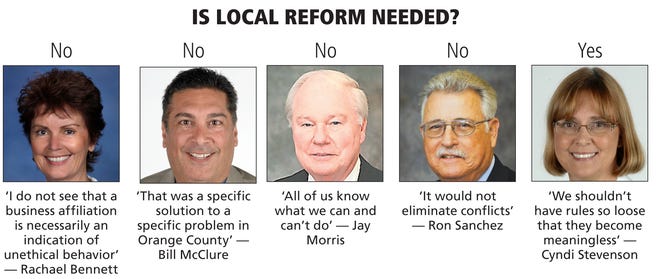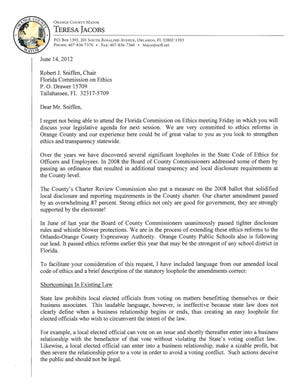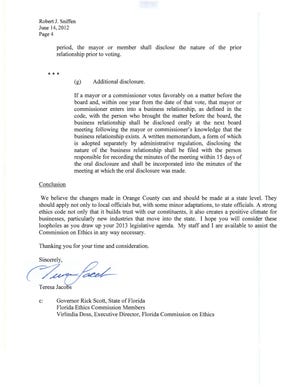Four out of five wealthy Dull Republican developer-directed St. Johns County Commissioners saw no need for ethics ordinance in 2013. In 2016,
In 2016, County Commission refused to support a lobbyist registration ordinance, with Ponte Vedra Republican Commissioner JOHN H. "JAY" MORRIS saying a $25 annual registration fee would be burdensome.
No Commissioner responded to my 25 suggestions for government reform, sent by e-mail March 15, 2022. Not one.
Stuart Korfhage, former Editor of the St. Augustine Record, is now Editor of the Jacksonville Business Journal.
From St. Augustine Record:
County politicians split on issue of ethics reform
Present ethics laws strong enough, say four of five commissioners

Issue: 'We have discovered several significant loopholes in the State Code of Ethics ... (that make it easy) for elected officials ... to circumvent the intent of the law (that they not vote on matters benefitting them or their business associates)' - Orange County Mayor Teresa Jacobs
***
The majority of St. Johns County commissioners do not support the ethics reform that the mayor of one of Florida's largest counties says is essential to close loopholes in the law that now make it possible for local elected officials to benefit financially from their votes.
Of the five commissioners, four said the reforms are not needed. They said the county does not need more regulation of elected officials, the county is small and people would know if there was a conflict and the county's present ethics laws are strong enough. One commissioner said the reforms are worth considering.
The ethics reforms were first raised by Orange County Mayor Teresa Jacobs in a letter last June to the chairman of the Florida Commission of Ethics.
She wrote that the state Code of Ethics has "several significant loopholes" that permit local elected officials to vote "on matters benefitting themselves or their business associates."
Specifically, she said those loopholes include:
¦ A county commissioner could work for a businessman on Tuesday, sever the relationship on Wednesday, vote on measures involving the company on Thursday and form a new business relationship with that person on Friday. All this could be done without making that information public. And it would not violate the law.
"Such actions deceive the public and should not be legal," she wrote.
¦ State law does not require that people list recent business partners, so local elected officials could vote on a matter that benefits someone with whom they have had recent business dealings and still be within the law. She proposed requiring elected officials to list their business relationships within the last two years.
Jacobs said those relationships should be required to be public "to eliminate the perception, and sometimes the reality, that an elected official may be offered a future stake in a business or real estate venture contingent on the outcome of his or her vote."
The state Board of Ethics did not act on her recommendations, but both the Orange County Board of Commission and the Orange Board of Education enacted her recommendations, which also include elected officials giving quarterly financial statements.
"It's very, very easy these days to circumvent the law," Jacobs said in arguing that the ethics rules are needed.
Local ethics rules strong
Commissioners Rachael Bennett, Bill McClure, Jay Morris and Ron Sanchez said there is no reason to alter or add to the local ethics rules already in place. They asserted that beefed-up guidelines aren't going to change the few politicians who are out to misuse their office.
"I don't think we have any ethics problems at all in St. Johns County," Morris said. "I don't see a need for additional laws. I think that (quarterly financial disclosure) is total overkill."
Commissioner Cyndi Stevenson, the longest serving member of the commission, says ending the loopholes in the law as Mayor Jacobs suggests has merit and should be enacted.
Sanchez, who like Morris is retired from the business world, said the tighter the disclosure requirements get, the more unethical politicians will cover things up. Sanchez was a home builder and Morris was executive vice president for a coating and sealant company based in Ohio.
"It would not eliminate conflicts," Sanchez said.
Both Morris and Sanchez pointed to the county's own ethics guidelines and training as providing enough direction for politicians and staff.
"All of us know what we can and can't do," Morris said.
Most of the local commissioners don't want to be tied up in regulations that don't have anything to do with them.
McClure, who along with Bennett is in his first year in office, said problems in one county don't necessarily mean there are problems in another. He said Jacobs' ideas are fine for Orange County, but that is no reason to force them upon everyone else.
"That was a specific solution to a specific problem in Orange County," he said.
Bennett said she isn't concerned about the possibility of business relationships corrupting politics. She also doesn't share Jacobs' fear of local elected officials being more susceptible to unethical behavior than anyone else.
"I do not see that a business affiliation is necessarily an indication of unethical behavior, and I do see that unethical behavior is possible and even probable in cases that do not involve any sort of business affiliation," she said in an email to The St. Augustine Record.
Stevenson, while saying there is no current ethics problem on the County Commission, agrees with Jacobs.
"I think they should close those loopholes," Stevenson said. "We shouldn't have rules so loose that they become meaningless. You erode the confidence of the public."
Stevenson said she's an admirer of Jacobs and likes her ideas. She would love to see statewide adoption of Jacobs' proposal so that each individual county was not tasked with establishing its own rule book.
"I think that it's better if there's one set of rules," she said. "I don't think you should be afraid of disclosures as long as you're (honest)."
Raising the bar
Ethics expert Dan Krassner has been pushing for better ethics guidelines as executive director with Integrity Florida. The organization is "a nonpartisan, nonprofit research institute and government watchdog whose mission is to promote integrity in government and expose public corruption."
He would like to see all levels of government in the state held to the same standard.
"Integrity Florida would be in favor of closing loopholes," Krassner said. "Florida's cities and counties have led the way in the last few decades in going further than the state laws."
He cited the leadership of Jacobs and Orange County in ethics reform.
"Orange County is one example of a community concerned about loopholes in state laws and resolving those concerns with local reform," he said. "Ideally, the ethical bar would be raised by the Florida Legislature to the highest possible level to ensure ethical practices at all levels of government."
Small town scrutiny
The local commissioners who do not believe Orange County's ethics reform is needed locally say that it would be nearly impossible for local politicians to get away with unethical actions.
Morris said that any attempt by a St. Johns County commissioner to use his or her position to do a favor for a business associate would be revealed.
"It would be pretty evident to the public," he said. "You probably wouldn't be able to get away with it because of all the scrutiny going on."
It would also be obvious to the other commissioners, and Morris said it's unlikely they would let another commissioner get away with any misconduct.
As an example, Morris pointed to a situation in which he recused himself from a vote. It wasn't an issue in which he had a business interest, but it was a land use issue that was near his neighborhood.
"I recused myself just because of the appearance, and I think you would get that with any commissioner in St. Johns County," Morris said.
Bennett agreed with Morris, saying that local politicians have personal relationships with many people they represent. Trying to sneak something past them would be pretty foolish, she said.
Morris said that any attempt by a St. Johns County commissioner to use his or her position to do a favor for a business associate would be revealed.
"It would be pretty evident to the public," he said. "You probably wouldn't be able to get away with it because of all the scrutiny going on."
It would also be obvious to the other commissioners, and Morris said it's unlikely they would let another commissioner get away with any misconduct.
As an example, Morris pointed to a situation in which he recused himself from a vote. It wasn't an issue in which he had a business interest, but it was a land use issue that was near his neighborhood.
"I recused myself just because of the appearance, and I think you would get that with any commissioner in St. Johns County," Morris said.
Bennett agreed with Morris, saying that local politicians have personal relationships with many people they represent. Trying to sneak something past them would be pretty foolish, she said.
Morris said sharing so much personal financial information keeps a lot of successful businessmen from running for office. The last thing he wants is to make public office even less attractive.
McClure, who continues to run his health care business while serving as a commissioner, agreed with Morris. He said the electorate already deals with ethics.
"We have ethics reform," he said. "It's called an election every two years."
The Record asked each of the county commissioners for a list of their clients. Morris, Sanchez, both of whom are retired, and Stevenson, who has given up her CPA practice, said they have no business clients. McClure provided a list of 126 present and former business clients for his company, MediCompanies. Of those, three are in Florida, but none is in St. Johns County.
Bennett owns a land consulting business called Cogito LLC. She did not respond to requests for her client list.
Not so restricting
While the closeness of St. Johns County - especially compared to the ever-changing population of the Orlando area - does discourage some of the problems of bigger cities, ethics reform doesn't have to restrict progress, Jacobs said.
Jacobs said the rules don't get in the way but actually facilitate good government. She said that having more transparency allows the public to have greater trust in what their elected officials are doing.
"It's a way of holding elected officials accountable," she said. "I think we've struck the appropriate balance."
Jacobs is also up front in her feeling that those who find the Orange County ethics guidelines too stringent should rethink their role in local government. If the rules in her city make some politicians recuse themselves on too many issues, perhaps that person's business interests are such that serving in office is not the best idea.
"Maybe this isn't the job for you," she said. "Part of what comes with this is your financial relationships should be an open book."








2 comments:
Gee, I can't imagine why Billy the Bamboozler McFraud Dog AkA Pill Mill Bill McClure wouldn't want ethics reform. Squatted and sold pills. Many suits, couple divorces, dead beat dad, and of course was fired.
That's a good picture of political tourist Billy the Bamboozler. Quite possibly his hair is blue by now.
Post a Comment